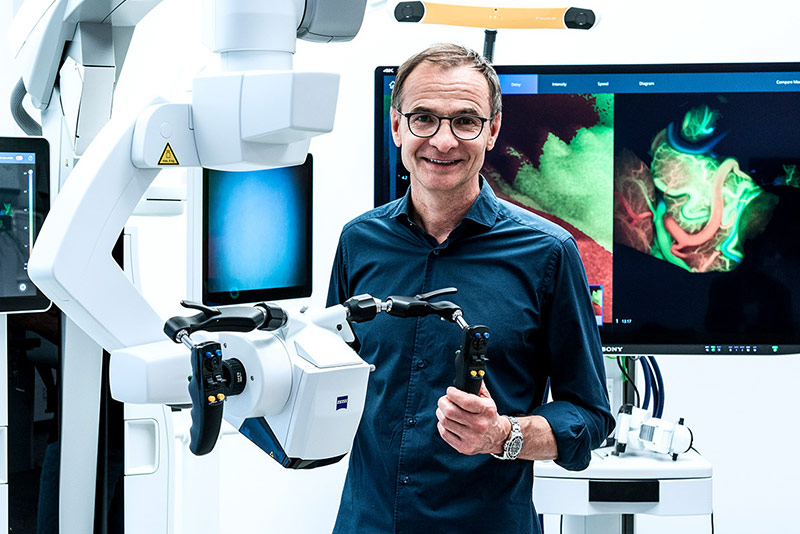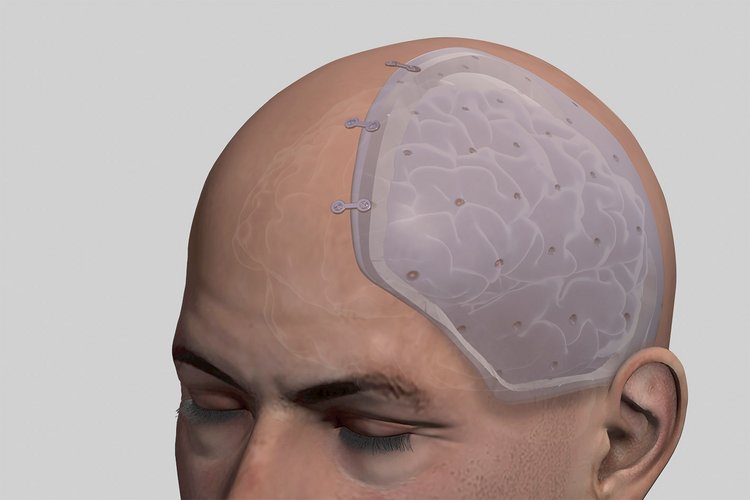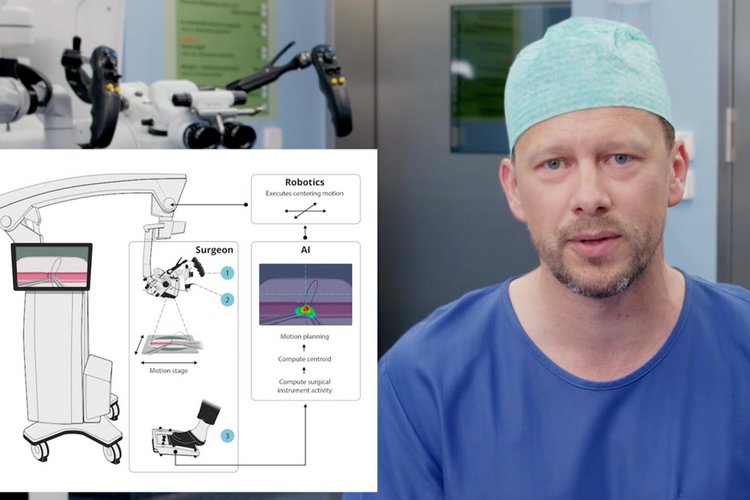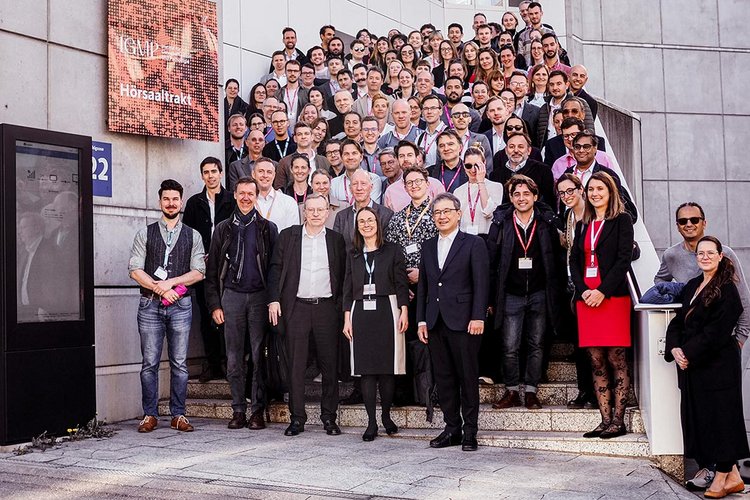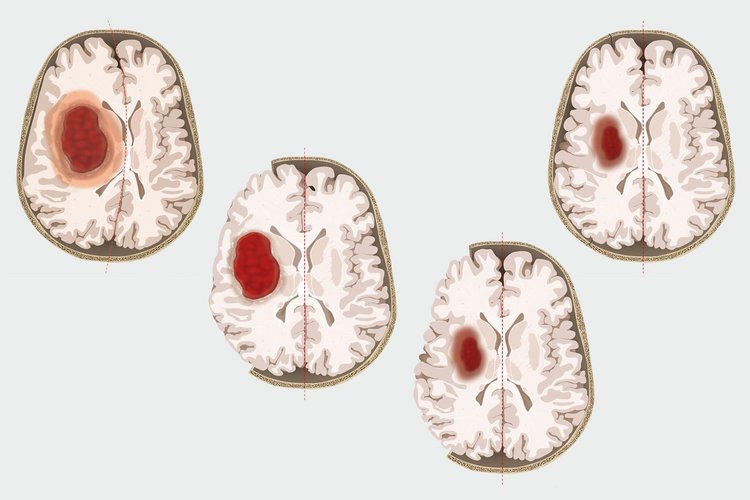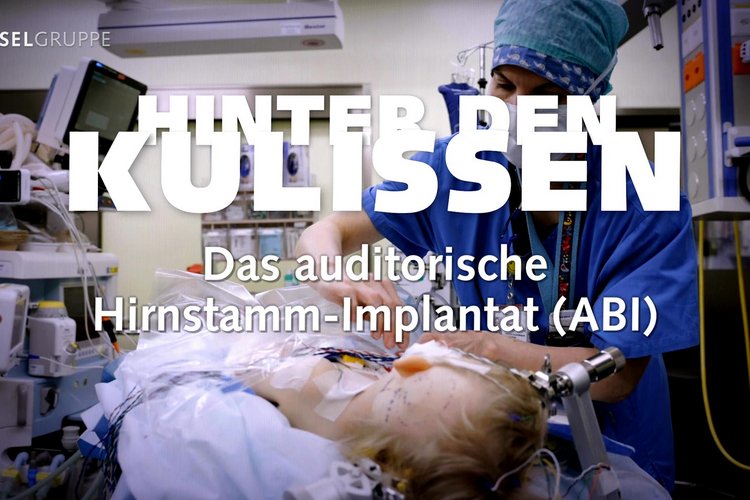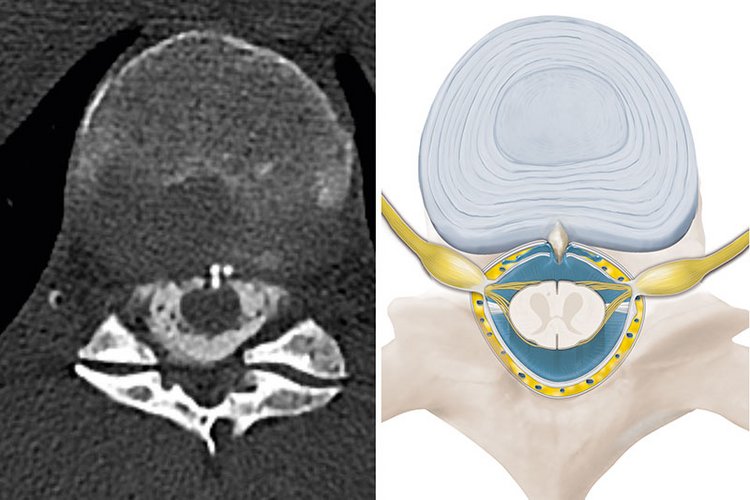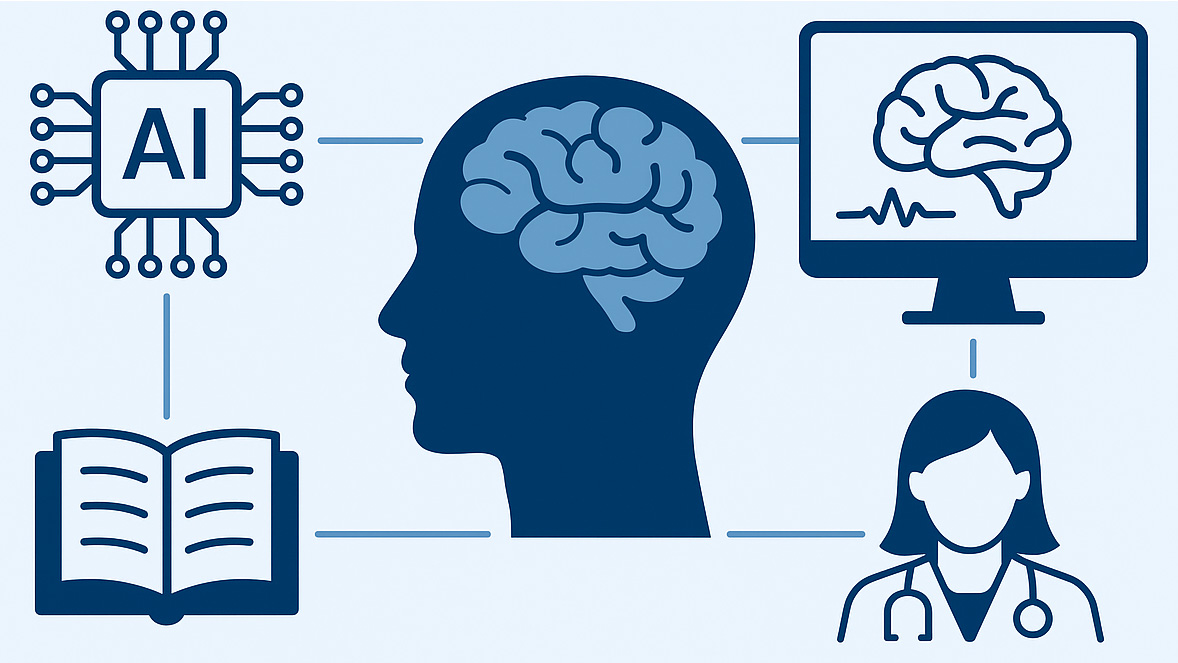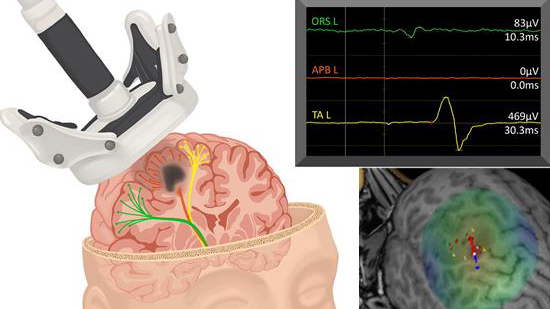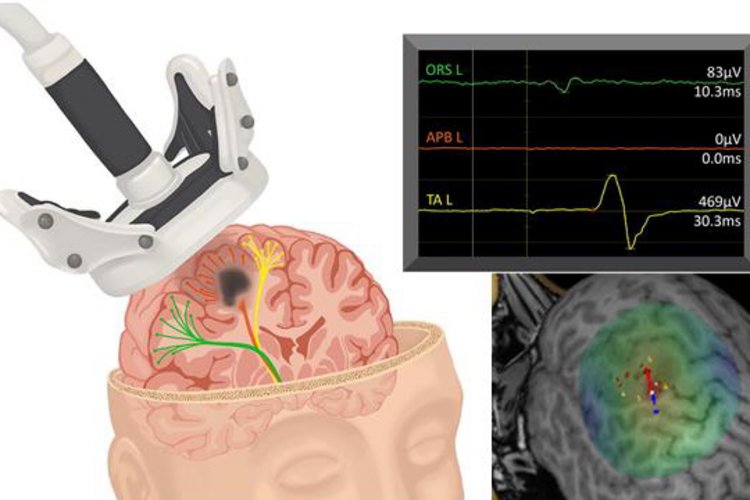
Neurosurgical research is crucial to further improving the safety and precision of operations on the brain and spinal cord. Our continuous research and development enables us to further refine surgical techniques and optimize treatment approaches to achieve the best therapy for our patients. Our projects and studies in neurosurgery at Inselspital, Bern University Hospital, play a central role in this.
Where does neurosurgical research stand today?
Neurosurgical research has made significant progress in recent years, particularly in the areas of neuro-oncology, functional neurosurgery and neurostimulation.
- Thanks to state-of-the-art technologies and imaging techniques, we are now able to visualize vital structures in the brain during tumor surgery, making even the most complex procedures safer and more precise.
- The development of brain pacemakers and new stimulation techniques such as deep brain stimulation has expanded the range of treatments for movement disorders such as Parkinson's disease, pain disorders and psychiatric illnesses.
- There has also been progress in the regeneration of nerve and brain tissue, for example through the use of stem cells and biomaterials.
- Artificial intelligence (AI) helps to tailor diagnoses and treatment plans to individual patients.
Your donation can help with
- the funding of innovative research projects: support for studies on new therapies, technologies or surgical techniques
- Training and continuing education: Funding of scholarships and training programs for young scientists and surgeons to maintain expertise and knowledge at the highest level
- Patient-oriented research: Development of new treatment approaches or rehabilitation techniques that directly benefit patients, such as individualized therapies or studies on quality of life and neuroregeneration
Support our neurosurgical research
Research project: Artificial intelligence in neurosurgery
Neurosurgery is one of the disciplines at the forefront of technology in modern medicine. Advances in imaging, surgical methods, and publications mean that the available knowledge is growing at an ever-increasing rate. This poses an enormous challenge for physicians: relevant work must be continuously reviewed, new concepts classified, and integrated into clinical routines. At the same time, the complexity of the field requires a clear structuring of knowledge in order to make learning processes efficient and ensure the highest level of patient care
Against this backdrop, our research project is investigating the use of artificial intelligence (AI) in neurosurgery. We want to find out whether and to what extent AI can improve medical training, access to research results, and the development of new scientific questions.
Our research approaches:
- Accelerated learning and systematic knowledge building: Can AI structure content, identify knowledge gaps, and enable individual learning paths, thereby supporting learning processes?
- Access to relevant literature: Does AI help to identify, classify, and utilize important publications more quickly?
- Integration of new findings into practice: Does AI help physicians immediately classify new knowledge in the clinical context?
- Support for scientific work: Does AI help develop hypotheses more quickly, review studies more efficiently, and implement research projects in a more targeted manner?
Unser Ziel ist es, KI nicht als Ersatz, sondern als intelligente Erweiterung des ärztlichen Denkens und Forschens zu verstehen. Wir sehen darin eine Chance, die Weiterbildung, die Qualität wissenschaftlicher Arbeit und letztlich auch die Patientenversorgung nachhaltig zu verbessern.
Our goal is to understand AI not as a substitute, but as an intelligent extension of medical thinking and research. We see this as an opportunity to improve continuing education, the quality of scientific work, and ultimately patient care in the long term.
In order to successfully advance this project, we depend on your support. Your donation will directly contribute to opening up new avenues in neurosurgical research and providing even better care for patients in the future.
MENTOR project
The MENTOR research project aims to improve postoperative stereotactic radiosurgery for brain metastases by specifically protecting motor-eloquent areas of the brain.
The research team led by Prof. Kathleen Seidel, Dr. Katharina Lutz (both neurosurgery) and Dr. Ekin Ermis (radio-oncology) is investigating whether postoperative mapping of the motor cortex using navigated transcranial magnetic stimulation (nTMS) can improve the precision of radiosurgical planning. In contrast to preoperative functional maps, this approach takes into account the anatomical changes after tumor resection. The individually obtained functional maps should make it possible to specifically keep the radiation dose away from motor-relevant brain tissue without compromising the effectiveness of tumor treatment. The team is supported in data analysis by Dr. Jonathan Wermelinger.
In the long term, MENTOR could establish functional brain areas as risk organs worthy of protection in radiosurgery and improve the neurological outcomes of patients with brain metastases.
LITT trial
Laser Intersitial Thermal Therapy for Ultra-Early, Pre-Radiotherapy Glioblastoma Recurrence
In around 40% of patients with glioblastoma, very early tumor regrowth is already evident in the planning MRI before the start of radiation therapy. There is currently no targeted treatment for this particularly early form of relapse. The LITT trial is investigating whether minimally invasive laser treatment can be used effectively in this situation, whether laser treatment can be integrated safely and without delay into the standard treatment regimen, and whether it can potentially improve the effectiveness of subsequent radiation and chemotherapy.
| Head of study: | Prof. Philippe Schucht, MD |
| Study coordinator: | Alexis Terrapon, MD |
RESDEX trial
Restrictive use of dexamethasone in glioblastoma
This clinical trial investigates whether neurosurgical treatment of brain tumors in certain patients can be performed without the additional administration of dexamethasone (cortisone), or only with a minimal dose of dexamethasone.
| Head of study: | Prof. Andreas Raabe, MD |
| Study coordinator: | Nicole Söll |
| Study identifier: | NCT04266977 |
ReSurge trial
Randomized Controlled Comparative Phase II Trial on Surgery for Glioblastoma Recurrence
To date, there are two established strategies for treating a recurrent brain tumor:
- Re-surgery of the brain tumor followed by second-line therapy (chemotherapy or radiotherapy).
- Immediate second-line therapy (chemotherapy or radiotherapy) without prior surgery.
Which of the two treatment strategies has the greater success has not yet been clarified. The aim of this study is to investigate exactly this. It is to be clarified which of the two treatment strategies has the greater success.
| Head of study: | Prof. Philippe Schucht, MD |
| Study coordinators: | David Hasler & Constanze Raltschev, PhD |
| Study identifier: | NCT02394626 |
SONOBIRD trial
A randomized, unblinded, multicenter, two-arm pivotal study of SonoCloud-9 combined with carboplatin versus standard lomustine or temozolomide in patients undergoing planned resection for first recurrence of glioblastoma
The standard treatment for a recurrent brain tumor usually consists of surgery and chemotherapy – for example with lomustine or temozolomide. The aim is to inhibit tumor growth. However, there is a natural barrier in the brain, the so-called blood-brain barrier (BBB): it prevents drugs that are transported via the bloodstream from reaching the brain tissue. If this barrier is made more permeable, chemotherapeutic drugs administered via a vein in the arm (as an intravenous infusion) can reach the brain tumor more easily.
This study uses an implantable medical device called SC9. When activated, this device emits ultrasound waves that increase the permeability of the blood-brain barrier when small bubbles (contrast agent) are simultaneously introduced into a vein. Several studies in animals and recent clinical trials with almost 70 patients in France and the USA have shown that the use of this device allows the opening of the blood-brain barrier and facilitates the introduction of chemotherapeutic drugs into the brain.
With the help of the study, we now want to find out what influence the SonoCloud 9 (SC9) therapy procedure in combination with carboplatin has on life expectancy and tumor growth in patients with recurrent glioblastoma.
| Head of study: | Prof. Philippe Schucht, MD |
| Study coordinator: | David Hasler |
| Study identifier: | NCT05902169 |
Space Shield trial
A Space-expanding Shield in Decompressive Hemicraniectomy for Stroke (SPACE SHIELD)
The Space Shield trial is a randomized, controlled, multicenter phase III study evaluating the effectiveness of a space-expanding shield in DCE for stroke patients.
Our objective is to compare this single-stage DCE using the space shield to the standard two-stage approach of DCE followed by cranioplasty(CP). We hypothesize that the single-stage strategy with the space-expanding shield will be non-inferior to the current standard treatment regarding functional outcomes.
Key features of the procedure:
- Single-stage approach: Combines decompressive hemicraniectomy and cranial reconstruction in one surgery, potentially reducing the need for a second operation.
- Space-expanding shield: A custom-molded implant designed to accommodate brain swelling while providing immediate cranial protection.
- Potential benefits: May decrease the risk of complications associated with multiple surgeries and improve patient recovery times.
| Head of study: | Prof. Philippe Schucht, MD |
| Study coordinators: | Constanze Raltschev, PhD & David Hasler |
| Study register: | NCT06638385 |

